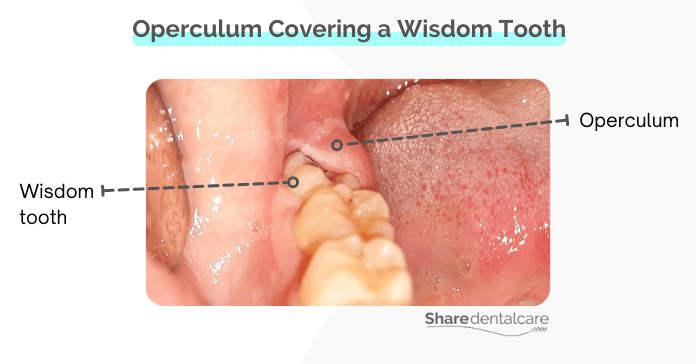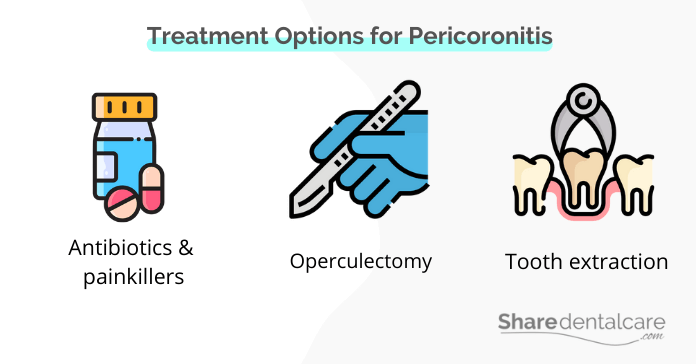Are you having problems with your wisdom teeth? You’re not alone. Many people experience pain and discomfort when their wisdom teeth start to come in. In some cases, the erupting tooth can even damage nearby teeth. One of the problems is the development of a flap of gum tissue, known as an operculum, over the partially erupted wisdom tooth. The operculum can become infected, leading to pain and swelling. In this blog post, we will discuss the operculum and how to treat it if it becomes infected.
What is Operculum?
The operculum is a flap of gum tissue that can form over a partially erupted wisdom tooth. It can occur on any tooth but is most common with lower wisdom teeth. Bacteria and food debris can get trapped under the operculum, causing infection and inflammation. The operculum can also make it difficult to brush and floss the tooth properly, which can lead to cavities. If you have an operculum, your dentist may recommend removing it or extraction of the wisdom tooth.

Pericoronitis: Infection of The Operculum Covering Wisdom Tooth
The operculum can become infected, leading to a condition called pericoronitis. Pericoronitis is an inflammation of the gum tissue surrounding a wisdom tooth. It usually occurs in partially erupted molars because bacteria and food debris can get trapped under the operculum.
Symptoms of Pericoronitis
- Pain and tenderness in the affected tooth
- Red and inflamed gum tissue
- Swelling of the gum tissue around the tooth
- The operculum may also bleed easily
- Pus discharge
- Difficulty opening your mouth (trismus) and jaw pain.
- Bad breath
- Bad taste in your mouth
If you experience any of these symptoms, you should see your dentist as soon as possible. In rare cases, the infection can spread to the head and neck, causing a life-threatening complication called Ludwig’s angina.
Treatment for Infected Operculum Over Wisdom Tooth
If you have an operculum covering wisdom teeth, your dentist may recommend one of the following treatment options:
- Antibiotics: the treatment plan may begin with a course of antibiotics to clear the infection. Your dentist will also clean any food particles or debris trapped in the area.
- Painkillers: your dentist may prescribe painkillers such as aspirin, acetaminophen, or ibuprofen to manage the pain.
- Operculectomy: if the wisdom tooth erupts normally, your dentist may recommend Operculectomy. It is a surgical procedure to remove the operculum covering wisdom teeth. It is usually done under local anesthesia.
- Extraction of wisdom tooth: if the operculum gets infected repeatedly or the wisdom tooth appears to be impacted, your dentist may recommend extracting the wisdom tooth. After the removal of the wisdom tooth, follow the tooth extraction aftercare instructions.
If you have an operculum over your wisdom teeth, it is important to see your dentist as soon as possible. If left untreated, the operculum can become infected and inflamed. the operculum can also make it difficult to brush and floss the tooth properly, which can lead to cavities.

Home Remedies for Infected Operculum Covering a Wisdom Tooth
Your dentist may recommend home remedies in conjunction with other treatments to help relieve pain and inflammation associated with infected operculum over wisdom teeth. Pericirinitis home remedies include:
- Rinse your mouth with warm saltwater.
- Take over-the-counter pain relievers such as ibuprofen or acetaminophen.
- Applying a cold compress to the outside of your cheek.
- Avoid hard or chewy foods.
- Practice good oral hygiene, including brushing and flossing regularly.
Operculum Wisdom Tooth – Conclusion
If you have an operculum over your wisdom tooth that is difficult to clean, it is important to see your dentist as soon as possible. If left untreated, the operculum can become infected and inflamed. The operculum can also make it difficult to brush and floss the tooth properly, which can lead to cavities. With prompt treatment, operculum over wisdom tooth is usually resolved without any complications. Treatment options include Operculectomy or extraction of the wisdom tooth. Visit your dentist to know which treatment option is suitable for you.